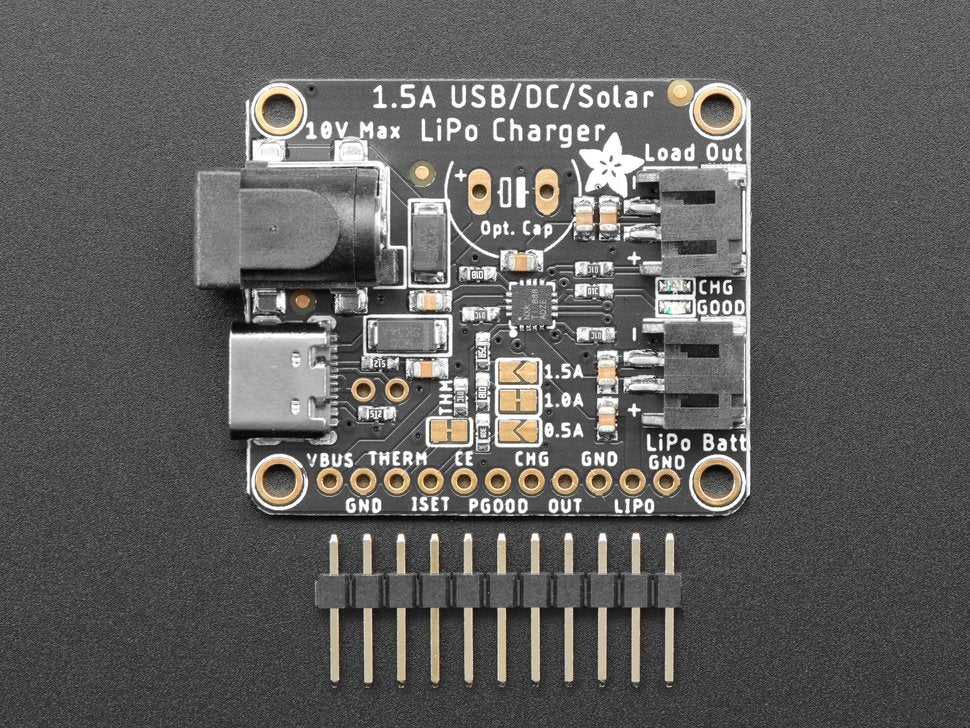Description
This charger is the only one you need to keep all your Lithium Polymer (LiPoly) or Lithium Ion (LiIon) rechargeable batteries topped up. No matter the power source at your disposal! The Adafruit Universal USB / DC / Solar Lithium Ion/Polymer Charger can use USB, DC or Solar power, with a wide 5-10V input voltage range! The charger chip is super smart, and will reduce the current draw if the input voltage starts to dip under 4.5V, making it a perfect near-MPPT solar charger that you can use with a wide range of panels.
Even though we designed it with solar in mind, it's also great as a plain USB or DC charger - we like that you can use 5V or 9V chargers without worry, and the high charge rate is great for quickly charging up those large battery packs!
- USB Type C port for modern computers and chargers
- Up to 1.5A charge rate
- Up to 10V input voltage, 28V protected
- Load output is regulated to never be over 4.4V so it's safe for 3.3V regulators or 5V boost converters
- No stabilization capacitor needed (although you can add one if you like!)
- Same load sharing so that DC/USB/Solar is prioritized over battery power when available, to keep the battery from cycling
- Power Good LED lets you know that the charger is working
- Less expensive
This charger is a breeze to use for solar projects: pick up any of our many 3.7V/4.2V LiIon batteries, and a 6V solar panel. Plug the battery into the BATT port using a 2-pin JST PH cable and the solar panel into the DC jack using a 2.1mm adapter cable Put the solar panel outside (and keep the battery out of the sun, it needs to be kept cool!) to start charging. You can power another project at the same time by connecting to the LOAD output port, which will never go above 4.4V.
The bq24074 which powers this design is great for solar charging, and will automatically draw the most current possible from the panel in any light condition Even thought it isn't a 'true' MPPT (max power point tracker), it has near-identical performance without the additional cost of a buck-converter. Our detailed tutorial on this charger includes a design document explaining how it all works.
For use with Adafruit Lipoly/LiIon batteries only! Other batteries may have different voltage, chemistry, polarity or pinout.
Comes with an assembled charger board, and bit of header. Does not come with a Lipoly battery or solar panel but we do have tons available in the shop that work quite well.
Features:
- 3.7V/4.2V Lithium Ion or Lithium Polymer battery charger
- Charge with 5-10V DC, USB or 6-10V solar panel, can have both USB and DC plugged in at the same time, higher voltage source will be used.
- Automatic charging current tracking for high efficiency use of any wattage solar panel
- Use any 6-10V solar panel
- Two color indicator LEDs - Power good and Charging
- Set for 1000mA max charge rate, can be adjusted to 500mA or 1.5A by soldering closed a jumper
- Will always draw the most current possible from a solar cell - up to the max charge rate!
- Smart load sharing automatically uses the input power when available, to keep battery from constantly charging/discharging, up to 1.5A draw. Load output is regulated to no-more-than 4.4V
- Optional Temperature monitoring of battery by soldering in a 10K NTC thermistor (not included) - suggested for outdoor projects where the battery may get hot (50°C) or cold (0°C).
